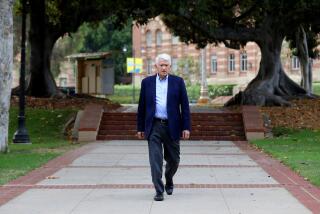Court Limits Challenges to Witnesses’ Testimony
In a decision denounced by Chief Justice Rose Elizabeth Bird as “an open invitation to judicial chaos,” a badly divided state Supreme Court on Monday limited the way prosecutors and defense lawyers may impeach the testimony of witnesses in criminal trials.
Ruling in a case involving Proposition 8, the 1982 anti-crime initiative, the court struck down the initiative’s command that all of a witness’s convictions may be introduced to impeach his credibility. Instead, the justices ruled, convictions involving crimes of “moral turpitude” may be introduced at the discretion of the judge. The court failed, however, to provide a concrete definition of “moral turpitude.”
The court was so badly divided on the case that none of the seven justices could muster a majority for his or her position. For example, the key standard of “moral turpitude” was favored by a plurality of three justices. None of the dissenting justices could find enough common ground to join in a majority ruling; instead, four dissenting opinions were filed.
“Today’s decision not only lacks . . . clarity but is an open-ended invitation to judicial chaos,” Bird wrote in one of the dissents.
The issue was the 1982 initiative’s command that lawyers be allowed to impeach a witness’s credibility by bringing up all the witness’s felony convictions.
The section was aimed primarily at defendants who take the witness stand on their own behalf, making it easier for prosecutors to undermine their testimony by citing convictions. It also has been used by defense lawyers, however, to attack the credibility of prosecution witnesses.
Prosecutors argued to the high court that with the passage of Proposition 8, trial judges no longer had discretion to bar introduction of such evidence.
Before adoption of the initiative, lawyers were allowed to admit into evidence only those convictions bearing on a witness’s believability, such as a perjury conviction.
The initiative, called the victims’ bill of rights, held that all convictions could be introduced into evidence.
The high court ruling Monday was that trial judges retain discretion to keep previous convictions out of evidence. But the justices went on to rule that the types of convictions that may be admitted now are those involving “moral turpitude.”
It defined crimes of moral turpitude only as “readiness to do evil.”
The moral turpitude standard appears to go beyond the standard in use before Proposition 8, but it falls short of the all-encompassing language of the initiative. Just how far that expansion will go will not be known until new cases reach the high court in coming years.
“We are going to have ask them to clarify this opinion,” said Deputy Atty. Gen. David D. Salmon, who argued the case before the high court.
“We did lose one important thing. They plainly said that ‘all’ does not mean ‘all.’ We lost one critical factor--the clear expression of the people on this subject. How significant that is we don’t know yet.”
Kaus, in the lead opinion, cited the U.S. Constitution and state law in overturning the section of the initiative.
”. . . There seems to be little doubt that the drafters of (the initiative) wanted a change and that the voters legislated it,” Kaus wrote in the lead opinion, joined by Justices Stanley Mosk and Allen Broussard.
“The question is, did they intend to throw out the baby with the bath. . . ?
“Did they really intend that an elderly victim of a mugging cannot avoid being impeached by a conviction for conspiracy to disturb the peace (a felony) suffered in her youth?”
Concluding that the judges retain discretion, the high court said: “If the framers intended that the trial court was to have no discretion to prevent impeachment with ancient offenses, have they not . . . cut off their noses to spite their faces? Even convicted felons may make a contribution to the search for truth.”
“It’s going to open a hornets’ nest,” said Richard A. Lieberman, lawyer for the defendant, Maria Castro, who was convicted in San Francisco of receiving stolen property.
When she took the stand on her own behalf, the prosecutor attacked her credibility by noting her convictions for heroin sale and possession of heroin.
The high court ruled (People v. Castro, crim. 23605) that heroin sale is a crime of moral turpitude and thus could be used--it would have been excluded under the old standard--while possession is not. But the court upheld her conviction, ruling that any mistake by the trial judge was insignificant.
In one of the three dissenting opinions, Justice Joseph Grodin said the initiative did preclude judges from disallowing evidence of convictions “whether we like it or not.”
Grodin wrote that the majority’s conclusion “will give rise to difficult problems of judicial administration” and called on the Legislature to enumerate the crimes of moral turpitude that can be used for impeachment.
Bird, joined by Justice Cruz Reynoso, argued in her dissenting opinion that the pre-Proposition 8 standard should remain and that only crimes that question a witness’s credibility should be used.
Pointing out the lack of definition of moral turpitude, she listed various definitions of the term set forth in previous court cases around the country.
One court called it “any crime or misconduct committed without excuse.” Another called it “any dishonest or immoral act.” A third court called it “everything done contrary to justice, honesty, modesty or good morals.”
More to Read
Start your day right
Sign up for Essential California for news, features and recommendations from the L.A. Times and beyond in your inbox six days a week.
You may occasionally receive promotional content from the Los Angeles Times.






